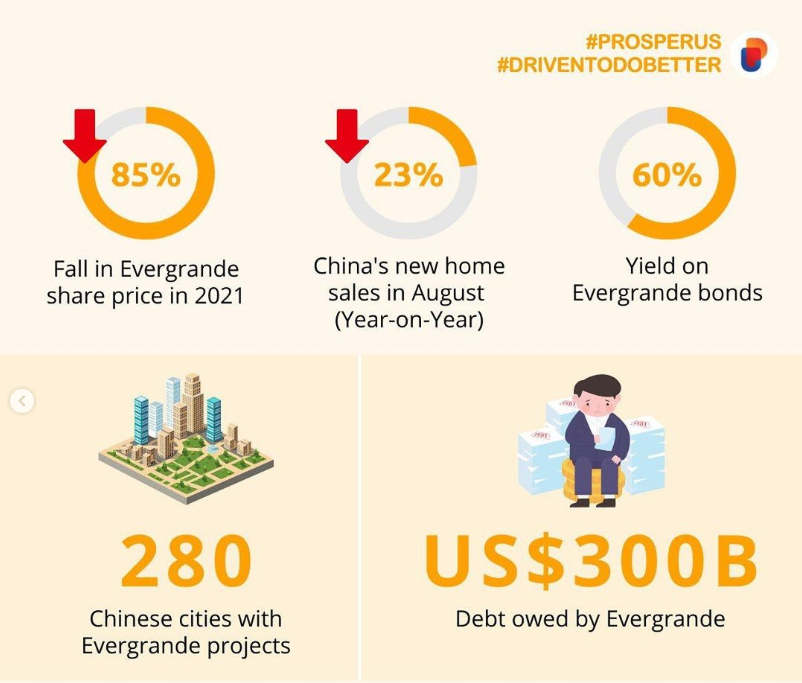The China Evergrande Debt Crisis: What’s It All About?
September 22, 2021

What happened?
Debt. It’s a scary four-letter word and it’s been the cause of a lot of investor anxiety over the past decade or so since the Global Financial Crisis of 2008/2009.
That was caused by (you guessed it) debt as well. But in China over the past week, a new debt worry has emerged for markets.
That has come in the form of property developer China Evergrande Group (SEHK: 3333), which is one of China’s largest real estate firms.
So far this year Evergrande shares are down nearly 85%, and was perhaps a harbinger of the crisis to come as its level of indebtedness was widely known about.
It’s been a tumultuous couple of weeks as investors brace themselves for China Evergrande to default on a portion of their massive US$300 billion in debt.
Bond coupon repayments by Evergrande, that are due this week, initially looked like they wouldn’t be repaid.

So what?
One of the biggest reasons the China Evergrande debacle has turned into a crisis is the sheer amount of debt that the real estate giant has.
As one of the largest property developers in the world’s second-largest economy, it’s frequently coined as a “systemic risk” to the Chinese financial system.
That even played out in US and European stock markets on Monday as global stocks sold off sharply on worries surrounding a possible default.
So what’s the big deal? For one, according to Capital Economics, out of China Evergrande’s US$300 billion in liabilities, approximately RMB 1.3 trillion (US$200 billion) of that is cash that Chinese residents have put down for unfinished homes.
That was one of the key reasons why understandably-upset individuals protested outside the company’s headquarters in Shenzhen in recent weeks.
Housing makes up a huge part of the Chinese economy and the housing market has recently been suffering – new home sales were down 23% year-on-year in August on a year earlier
Now what for investors?
It was announced just today (Wednesday) that the People’s Bank of China (the country’s central bank) had injected RMB 120 billion into the banking system to help shore up liquidity.
This came in combination with China Evergrande’s announcement that its onshore unit would repay interest due on local RMB bonds.
However, question marks still remain over payments on its offshore bonds. China’s slowing economy and a reluctance from the government to offer any assurances to markets have also had investors on edge.
Despite this, the consensus view is that China Evergrande’s situation will be resolved with some sort of hybrid bailout where the government will step in, but without further encouraging “moral hazard”.
Whatever the outcome, it’s increasingly likely that housing (or the lack of its affordability) is going to be a main focus for the Chinese government as it realigns its policies to focus on “common prosperity”.
Long a bugbear for the average Chinese citizen, housing prices have come more into focus in the recent Chinese crackdown.
The latest fiasco with Evergrande will just highlight to government officials that stricter financing limits, and oversight, will be needed for the housing market.
As a result, investors can expect a higher level of state involvement in the coming years.
For longer term investors, the major worry is actually the impact that a slowdown in the housing market will have on broader growth of a Chinese economy that is already slowing as it battles the Delta variant of Covid-19.
Only time will tell how this all plays out and what it means for China’s overall economic growth rate.
Disclaimer: ProsperUs Head of Content Tim Phillips doesn’t own shares of any companies mentioned.

Tim Phillips
Tim, based in Singapore but from Hong Kong, caught the investing bug as a teenager and is a passionate advocate of responsible long-term investing as a great way to build wealth.
He has worked in various content roles at Schroders and the Motley Fool, with a focus on Asian stocks, but believes in buying great businesses – wherever they may be. He is also a certified SGX Academy Trainer.
In his spare time, Tim enjoys running after his two young sons, playing football and practicing yoga.






